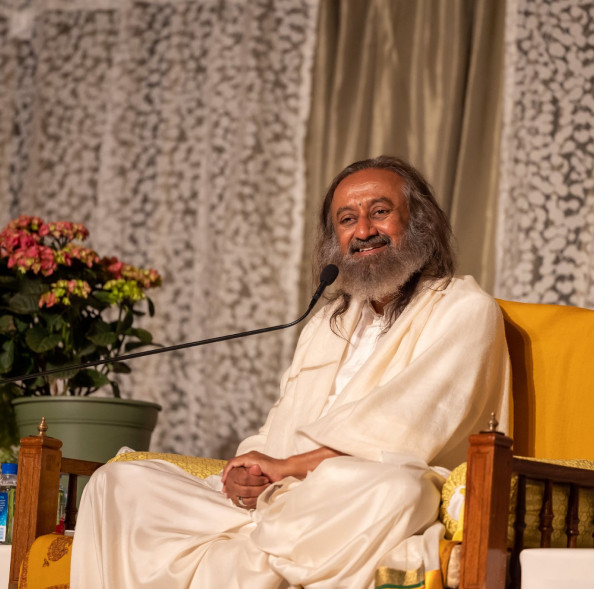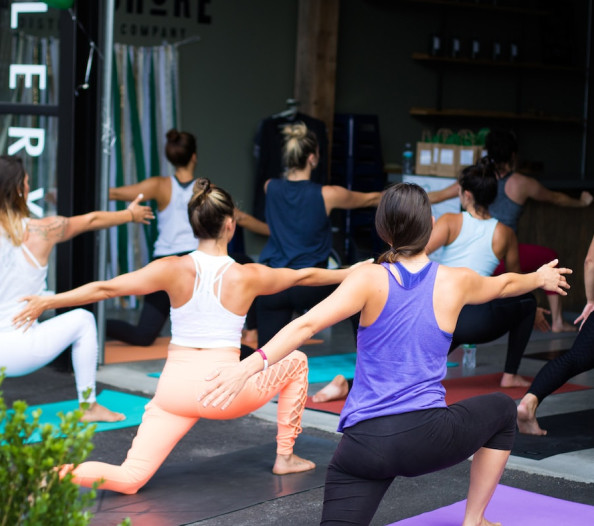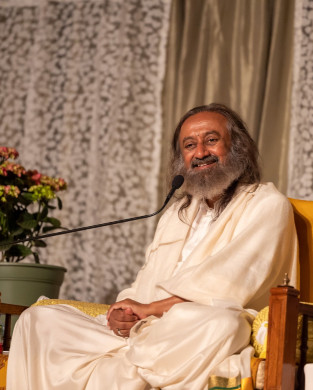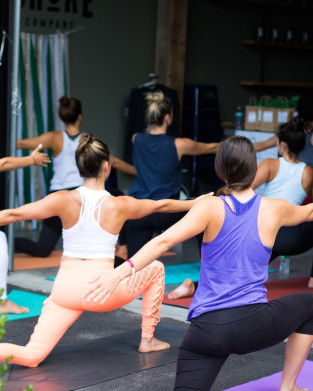The Art of Living Difference

42+ years
of service to society

10,000+ centers
worldwide with weekly follow up sessions

180+ countries
where we make a difference

500M+ lives
touched through our courses and events
Our Flagship Courses
The Happiness
program
- Create lasting happiness 500M lives changed
- Evidence-based breathing techniques - practiced for over 42 years
- Proven techniques globally - over 10,000 centres
The Art of Meditation Sahaj Samadhi Meditation
Children &
Youth classes
Yoga classes
Featured in
Free Introduction to the Happiness Program
- Join a Free 75min Introductory Session
- Learn evidence-based breathing techniques to calm the mind
- Experience a guided relaxation & learn about the nature of the mind


Powerful programs brought to you by Gurudev Sri Sri Ravi Shankar.
Gurudev Sri Sri Ravi Shankar is a global humanitarian, spiritual leader, and peace envoy, who has been teaching breath-based meditation techniques for health and well-being for more than 40 years. His approach blends ancient Vedic wisdom with modern sensibility for a new paradigm of leadership, living a stress-free life and creating a violence-free society.
Through Gurudev’s programs, millions of people worldwide have found peace and resilience in the face of adversity, learning not only how to excel in their own lives, but also how to become powerful agents for social change.

Additional courses
Explore Art of Living’s revolutionary range of courses to help master your mind and develop into your personality.
Sri Sri Yoga
- Authentic yoga practice that deeply benefits the mind.
- Experienced & certified instructors to guide you through evey step of the way.
Kids & Youth Courses
- Build confidence, develop a well-rounded personality, and nurture human values within your child.
- An engaging life-skill program that helps establish their values.
Intuition Process
- Revolutionary two-day program for children and teenagers from 5 years up to 18 years of age.
- Learn Art of Living’s proven techniques on brain activation & meditation.
Happy Experiences
Looking for advanced techniques?
Advanced Courses
*open to people who have completed the Happiness Program
Classes Across Australia
Art of Living hosts meditation and yoga classes across Australia, allowing people to connect with
like-minded individuals to understand the nature of the mind and find peace.
Questions?
The average cost of a meditation class in Perth ranges from $20 - $150, averaging around $55 - $60 per class. The cost of meditation classes in Perth depends on the type of meditation, the experience, group class or private and the duration of the meditation.
The cost of one-on-one meditation classes in Perth range from $75–$200 per hour on average.
How long you meditation as a beginner depends on your preferences, life circumstances, and the time available. You can begin with 5-10 minutes and then gradually build up to 20 minutes or even longer (not required). As a general guideline, 20 minutes is an ideal length of time to start meditating as a beginner. We also recommend you read our article A beginners guide to meditation or 8 tips to get started with Meditation to help you find out some trick and tips to start you on the way.
and watch our video 10 Minute Guided Meditation for Beginners to help you find out some trick and tips to start you on the way.
We also recommend you read our article A beginners guide to meditation or 8 tips to get started with Meditation to help you find out some trick and tips to start you on the way. And watch our video 10 Minute Guided Meditation for Beginners to help you find out some trick and tips to start you on the way.
There is no “good” or “bad” meditation. There is no “success” or “failure”. There is no such thing as the perfect meditation. Take your meditation day by day. It’s best not to judge your meditation. It’s hard to quiet the mind, and sometimes you can feel like you are not meditating correctly and feel like giving up. That is completely normal. With practice, you will learn to navigate these negative thoughts and distractions, which is an important part of your meditation journey and experience- quietening the noise of your mind and life. Meditation is a lifelong journey. Take it session by session, day by day. And don’t expect instant results. Meditation is a skill that grows with patience and practice. You will experience some benefits with each session. And you may start noticing even bigger changes gradually over a period of time. Rather than analysing your present emotions, stay more connected with yourself and enjoy the benefits that follow.
The time you choose to meditation varies from each person. Realistically, the modern world with all its task, schedules and appointments requires a balance that suits your lifestyle and life.
Most people choose to meditate in the morning, rested for the day. Others prefer at night ready for sleep and relaxation. A modern lifestyle requires a modern meditation schedule
You may find that you experiment and try different times, lighting and locations that suit your lifestyle, your schedule and your preference.
This is YOUR journey; therefore, you need to find what works for you. There is no correct answer, there is no perfect time, you do what is right for you.
With that in mind, there are certain times of day that you may find it easier or preferable to meditate:
- Rise with Sunrise.
Many meditators find Sunrise an effective time to meditate. If you are an early-rise this time may suit you perfectly, to start your day off and set the tone for the rest of your day. At Sunrise, the outside world is quiet which is perfect to quiet the mind and a great time for reflection.
- Sunrise, Sunset.
The natural transition from day to night and reversed is also an ideal time for meditation and reflection and is truly a perfect way to start or end the day.
- A quiet time to relax and be present
Choose and reserve a time that suits your household and schedule. If you know there is a particular time when the kids have gone to school, you have some time to yourself or that you know that the house is quiet, then use that time to meditate. Meditation is your time to relax and be present with yourself, a time away from distractions, disruptions and the outside world. Free yourself from distractions and allow yourself the time you deserve.
- Try to create a schedule and meditate the same time every day.
A daily routine helps consequence any hinderances, start finding preferences and eliminates any questions on if you have time or what time is best. At first, try out different times, note down what works for you and then STICK TO IT. Or try at least.
There is a great power in habits, it allows for you to schedule, to plan and to reserve a time for you to allow yourself to focus on you.
Yes, it is okay to meditate in bed, you can meditate where you feel comfortable, but we do not recommend meditating in bed or lying down. Meditation is a form of conscious relaxation where the mind is alert yet relaxed. When lying down, the mind tends to fall asleep and may cause you to lose your alertness.
If you are new to meditation and using guided meditation, music is fine. But sometimes music can act as a distraction and hindrance than a help. Once you are a pro and have established yourself in your meditation practice, you may not need any music. Here is what our experts share about the pros and cons of using music while meditating
If you are new to meditation and using guided meditation, music is fine. But sometimes music can act as a distraction and hindrance than a help. Once you are a pro and have established yourself in your meditation practice, you may not need any music. Here is what our experts share about the pros and cons of using music while meditating
How long you meditation depends on your preferences, life circumstances, and the time available. You can begin with 5-10 minutes and then gradually build up to 20 minutes or even longer (not required). As a general guideline, 20 minutes is an ideal length of time to meditate.
As the eyes are one of your five sense organs, we suggest keeping your eyes closed to heighten your other senses.
When the eyes are open, you remain connected to your surroundings, letting the outside world and thoughts remain and keeping your mind active. Therefore, it cannot fully relax. Closing your eyes will help quieten the mind and prevent the outside problems from hindering your journey inwards, allowing you to bring your attention within and fully rest.
This takes practice, and often closing your eyes can cause your mind to race, therefore focusing on an object and keeping your mind still, then closing your eyes gradually will help gradually close the flow from state of alertness to state of rest.
Sit straight and comfortably without feeling rigid
Sit still as much as possible.
Since the mind and body are connected, moving the body tends to keep the mind moving and active, by sitting still you're one step closer to a quieter, relaxed mind
Use chairs, meditation cushions, and pillows to help you find a relaxed, upright posture
Keep your palms open and rest them on your knees to help the free flow of life force energy.
Yes, meditation can change your personality and have a positive effect on your emotions and can help alleviate anxiety, stress, depression and feeling of low self-worth or hopelessness.
Meditation changes your personality by having a positive effect helping you rest deeply, release stress and get your balance back.
Meditation practice, breathing and relaxation techniques can change your personality and have been scientifically backed to release accumulated stress, reduce anger, increase happiness and fulfillment for mind, body and soul.
Meditation can change your personality to help forgetfulness. There has also been evidence-based studies and Science behind Meditation bene linked to Alpha Brain Waves and improve brain function.
Meditation can also change your personality by helping your other bodily functions as meditation has also know to help the sensory organs become more attuned, for example hearing finer notes within a piece of music or better concentration.
The benefits of meditation and assimilation into daily life can help you rest deeply, release stress and get your balance back. Meditation practice, breathing and relaxation techniques have been scientifically backed to release accumulated stress, reduce anger and increase happiness and fulfilment for the mind, body and soul. In addition, some evidence-based studies have shown that meditation is linked to Alpha Brain Waves and improves brain function. Meditation has also been known to help the sensory organs become more attuned, for example, hearing finer notes within a piece of music or better concentration.
Some say they feel the benefits of meditation instantly and that it improves sleep deeply, helps them feel less stressed and gets their balance back after a few sessions. However, meditation is a lifelong journey. Take it session by session, day by day. And don’t expect instant results. Meditation practice, breathing and relaxation techniques have been scientifically backed to release accumulated stress, reduce anger and increase happiness and fulfilment of mind, body and soul. Many evidence-based studies have shown that meditation is linked to our Alpha Brain Waves and improves brain function. Meditation has also been known to help the sensory organs become more attuned, for example, hearing finer notes within a piece of music or better concentration.
End your meditation gently and without any rush. As you come to the end of the meditation, do not hurry to open your eyes or to move around. Simply remain present in the moment and enjoy the stillness that you cultivated through meditation. Take a few moments to soak this in. When you are ready, gradually become aware of your surroundings and finally slowly open your eyes. As you open your eyes, it’s best not to judge your meditation. Meditation is a lifelong journey. Take it session by session, day by day. And don’t expect instant results. Meditation is a skill that grows with patience and practice. You will experience some benefits with each session. And you may start noticing even bigger changes gradually over a period of time. There is no “good” or “bad” meditation. There is no “success” or “failure”. Rather than analysing your present emotions, stay more connected with yourself and enjoy the benefits that follow.
After 8 weeks of meditation, you will notice you are able deeply, feel less stressed and get your balance back. Some say they feel the benefits of meditation instantly. Meditation practice, breathing and relaxation techniques have been scientifically backed to release accumulated stress, reduce anger, increase happiness and fulfillment for mind, body and soul. There has also been evidence-based studies and Science behind Meditation bene linked to Alpha Brain Waves and improve brain function. Meditation has also known to help the sensory organs become more attuned, for example hearing finer notes within a piece of music or better concentration.
Contact and Directions
PO Box 240
Joondalup
Perth, Western Australia, 6027 See Additional Contacts










